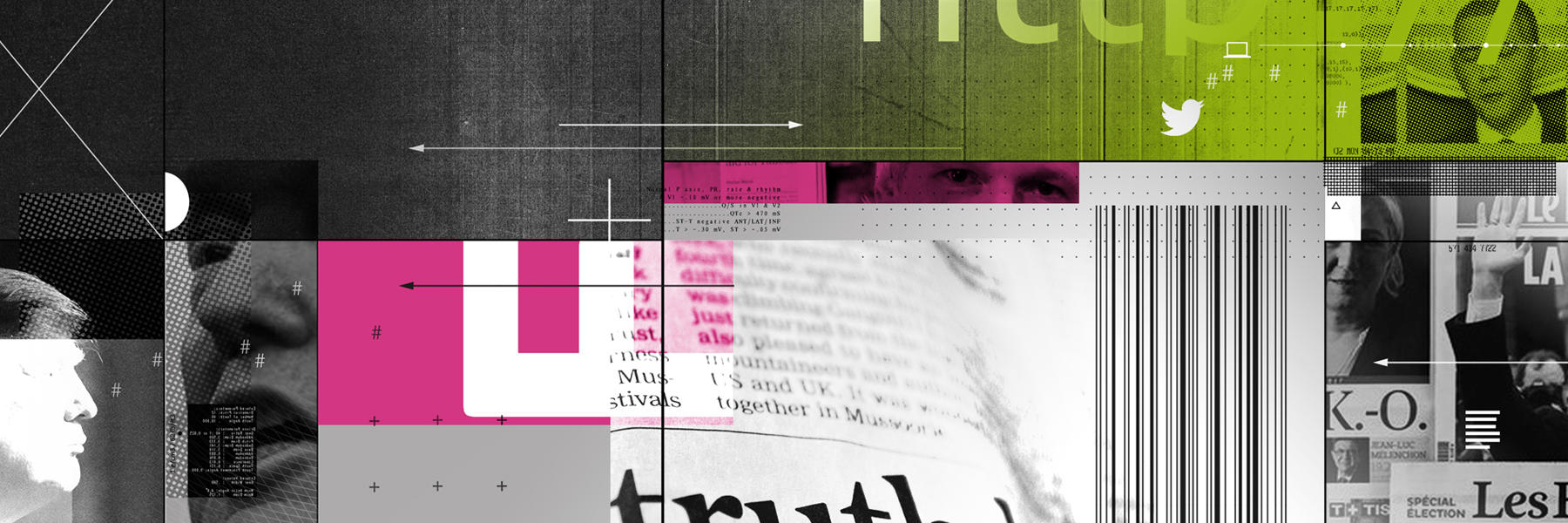

How Switzerland has responded to online disinformation
If the 2016 US presidential election helped to popularise the term “fake news”, then the Covid-19 pandemic has shown just how disruptive the problem can become if left unchecked.
Few places in the world were spared the novel coronavirus in 2020, much less the onslaught of misleading information surrounding the disease. Switzerland was no exception. A little-understood virus that forced the government to shut down normal life to control its spread inevitably led people to seek answers.
Enter conspiracy theories and alternative media stories, which have gained in popularity and helped to fuel protests against government restrictions and the flouting of rules, like mask-wearing, designed to protect the population.
Edda Humprecht, a communications researcher at the University of Zurich, explains their appeal in times of uncertainty: “We have a clear narrative – black and white – and someone to blame.”

More
Swiss corona protests: conspiracy theories vs political rights
Time for action?
Despite this trend, alternative media remains “niche” in this small, linguistically fragmented country. As Humprecht and other experts told swissinfo.ch, low polarisation, a relatively vibrant news media landscape, and a heightened awareness of fake news among the public make it less likely that disinformation – intentionally false information – will spread in the Alpine nation.

More
Resisting Covid-19 ‘fake news’ with a high dose of public trust
Nevertheless, even before the pandemic began, there appears to have been a shift in thinking at the political level. Once happy to simply keep an eye on the problem and, like many states, reticent to lay down stricter ground rules for the use of social media, the Swiss government is now said to be exploring whether legislation is needed to combat online disinformation and hate speech.
But the problem is complex and one that, as experience in other countries has shown, cannot be easily solved by the arm of the law without raising concerns about freedom of expression or censorship.
It is also changing quickly. Manipulators are always one step ahead of regulators. Online platforms themselves are a moving target, as users regularly change their consumption habits.
Although Facebook remains the world’s most popular social networking site, the messaging service WhatsApp was the most widely used by the Swiss, the Research Centre for the Public Sphere and Society (fög) reported in 2019. In closed discussions, it warned, “problematic content” can escape wider scrutiny and spread quickly through so-called “echo chambers”.
Opportunities and challenges
For Swiss researchers, it’s long been clear that the problem of “fake news” offered an opportunity to innovate. Some have been experimenting with ways to detect ever more sophisticated information manipulations, such as deepfakes.

More
How Swiss scientists are trying to spot deepfakes
Others were quick to re-orient ongoing research to look at the population’s information behaviour during the pandemic, dubbed an “infodemic” by the World Health Organization for the “over-abundance of information [on the virus] that makes it hard for people to find trustworthy sources.”
Misinformation has also been a preoccupation – albeit of a different sort – for the mainstream media, as it struggles with shifts to digital news consumption and plummeting ad revenues, a problem made worse by Covid-19.
“Fake news? Not in the Swiss Press”, according to a campaign by the media association Schweizer Medien, keen to separate its outlets from the bad apples.
Reader trust in legacy media is just above the global average in Switzerland, the Reuters Institute reported in 2020, and according to the experts at fög, the quality of reporting on the pandemic was especially high. Research shows the population relied more heavily on traditional news media – including the public broadcaster, swissinfo.ch’s parent company – than on social media for information on the virus.

More
How Switzerland kept in touch during Covid-19
Slow response from big tech
Yet social platforms, despite being vectors of misleading content, have been rather complacent. Mostly unwilling to share data with misinformation researchers, they’ve also been reluctant to adhere to their own terms of use, as communication and marketing professor Stefan Gürtler pointed out. Twitter shut down only a few of the numerous hoax accounts his team detected during an especially polarised nationwide vote (on the Swiss broadcasting license fee) in 2017.

More
‘Fake news’: The thorny question of safeguarding elections
The unprecedented health crisis and the high stakes at play in the 2020 US presidential election have forced the companies’ hand to some extent. Some have made pledges, including to ban false information about the safety of vaccines, and removed or placed warnings on other misleading posts – President Donald Trump’s included.
But many more continue to circulate – one UK study found platforms failed to remove 95% of vaccine misinformation reported to them – threatening democratic institutions and public health alike.

More
Why a pandemic is the ideal breeding ground for fake news

In compliance with the JTI standards
More: SWI swissinfo.ch certified by the Journalism Trust Initiative





































